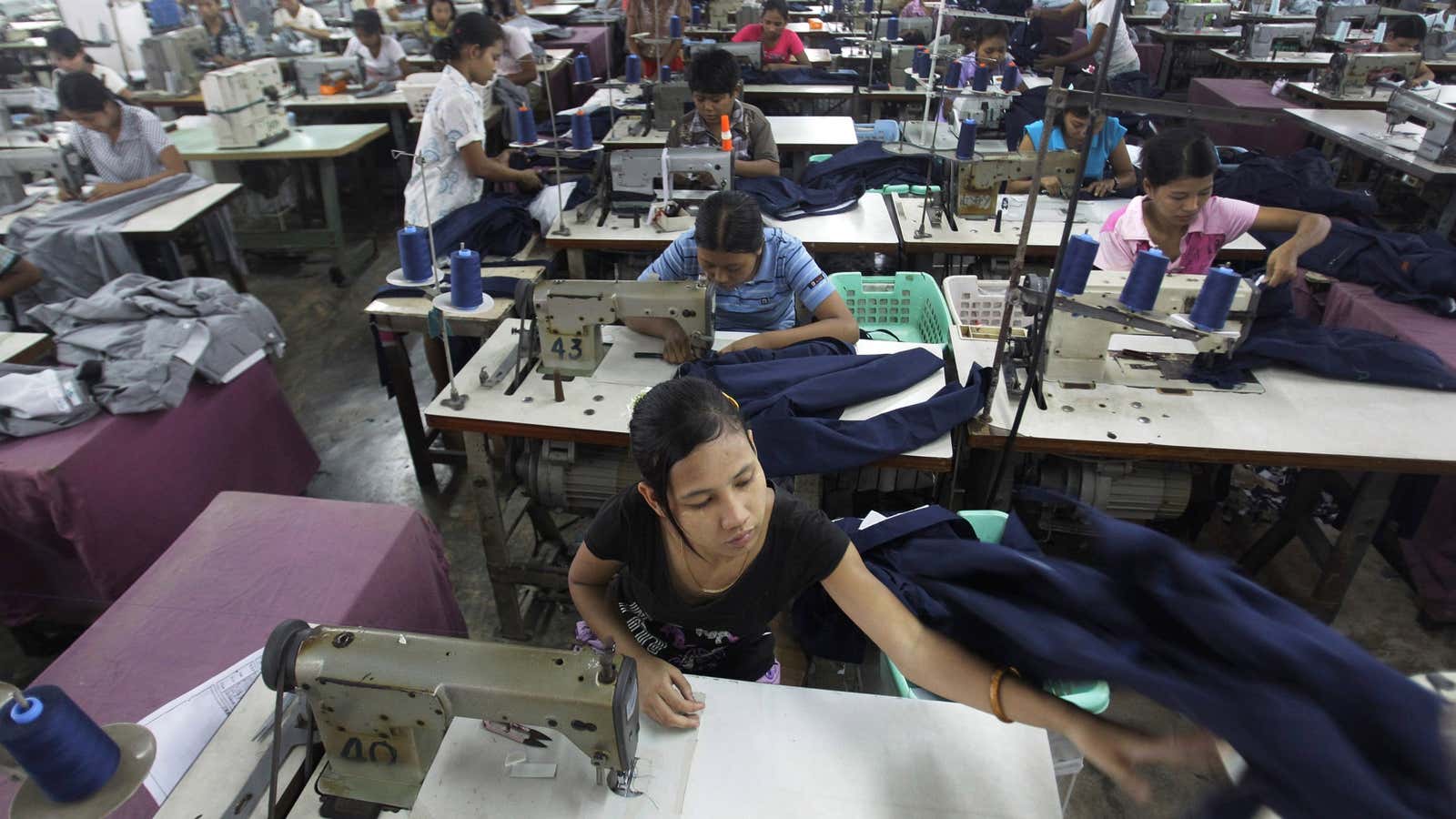After months of negotiations with labor groups and employers, the government of Myanmar has established a national minimum wage for the first time in the country’s troubled history. Workers will now have to be paid at least 3,600 kyat ($2.81 at current exchange rates) for a standard eight-hour day. That works out to roughly 35 cents an hour.
The new wage law takes effect Sept. 1. Companies with fewer than 15 employees will be exempt from the new law, which otherwise applies to all businesses in all sectors.
It has taken years to get here. A proposal introducing a daily minimum wage received parliamentary approval in 2011. The National Minimum Wage Committee announced the amount on Aug. 28.
The new standards will put Myanmar’s minimum monthly pay at around $67 a month for someone with a six-day work week—as much as 4.5 times what unskilled entry-level workers had been receiving. By comparison, the monthly minimum wage in nearby Vietnam, which has a thriving garment industry, ranges from $90 to $128, depending on the region.
In Bangladesh, based on a five-day work week, the minimum wage is 1,500 taka ($19.29) per month for all economic sectors not covered by industry-specific wages; in the garment industry it’s 5,300 taka ($68.16) per month. And in neighboring Thailand, where an estimated 2 million Myanmar nationals form part of a large migrant labor force, the national minimum wage is 300 baht ($8.36) per day.
Myanmar, which has about 300 garment factories, exported $1.5 billion of clothes and materials in 2014, according to Reuters, up from $1.2 billion the previous year and $947 million in 2012.
Many employers, not surprisingly, were opposed to the wage law. In July, more than 200 representatives from 145 garment factories voted unanimously against the 3,600-kyat minimum, at a meeting of the Union of Myanmar Federation of Chambers of Commerce and Industry. They shared the results with the National Minimum Wage Committee.
Factory bosses, citing productivity and overtime pay concerns, called for a much lower floor, around 2,500 kyat per day, according to the Myanmar Times.
But trade groups representing global companies sourcing from Myanmar, or considering investments in it, threw their weight behind the new legislation, saying it would do more to attract foreign investment than deter it. The Fair Labor Association—which counts Adidas, New Balance, and Patagonia among its members—explained its support in a letter (pdf) to the National Minimum Wage Committee:
A minimum wage set through consultation with relevant stakeholders will attract rather than deter international companies buying garments from Myanmar, who have committed to paying living wages through their supply chains. Our concern is that any exemption negotiated for the garment industry would lead to hundreds of thousands of garment workers not having a wage that meets their basic needs. Our experiences with other countries in the region suggest that this could lead to work stoppages and industrial unrest. Any industrial unrest, in contrast to higher wages, is much more likely to make international companies reconsider their business relationships and investments in Myanmar.
The Ethical Trading Initiative, which includes Gap, H&M, and Debenhams Retail, also has backed the measure.
But in the short term, the new law might result in thousands of workers losing their jobs—in July about 30 garment factories, mainly from China and South Korea, threatened to close down should the minimum wage take effect. Those closures reportedly could lead to more than 70,000 job losses, and start as early as this week.
